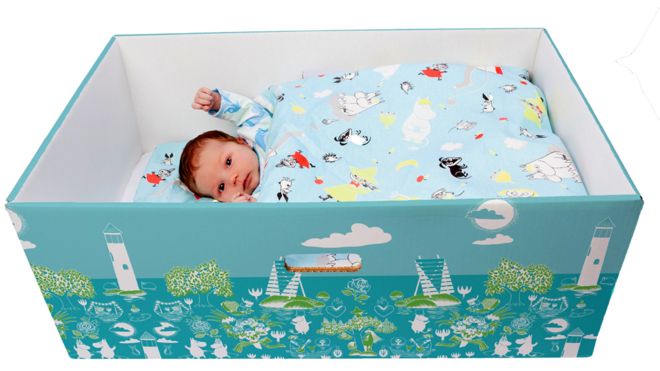What began as a relatively unknown way of life in Finland has majorly taken off – in a variety of ways – across the world.
A growing number of babies are sleeping in boxes.
It has been a tradition since the 1930s for every expectant mother in Finland (regardless of income) to receive a baby box from the government. The box is basically a baby starter kit, filled with clothes, sheets, bibs, nappies, outdoor gear, a sleeping bag, and toys. It also contains a small mattress that perfectly fits the bottom of the box, creating the baby’s first bed.
Genius, right?
The concept has been attributed to helping the country achieve one of the world’s lowest infant mortality rates (and yes, it’s higher than Canada’s).
[ad_bb1]
BBC Magazine pretty much broke the concept to the world almost three years ago with a story that went viral and was read by 10 million people in 18 months. It didn’t hurt the growing buzz when the Finnish government gave a baby box to the Duke and Duchess of Cambridge when they were expecting Prince George.

The Baby Box Co.
The baby box became rapidly known for its simple and effective design, offering an attractive option to health professionals and social entrepreneurs alike according to a BBC Magazine article. Needless to say, it hasn’t taken long for the concept to take off on a global scale, becoming adopted to serve women in a variety of regions as companies begin supplying baby boxes to expectant parents all over the world. The contents of the boxes and the way they are distributed are now tailored to address unique local problems.
For example, two South African entrepreneurs decided that a plastic box that can be used as a bath as opposed to a bed would be more useful to mothers in that region. The main objective with the box, however, was to get the mothers to antenatal classes. The ‘Thula Baba Box,’ encourages South African mothers to attend clinics at an earlier stage of pregnancy, and to attend more often. Attending the classes reduces the risk of an HIV-positive mother dying in childbirth or passing the virus onto the baby, among other things. The hope is that the project – which will soon be rolled out across the Western Cape region – may one day become a national program.
Meanwhile, Karima Ladhani, a doctoral student at Harvard University, developed the Barakat Bundle project, which is now in full swing at a rural hospital in Jagadiya, India. This baby box includes a clean-birth kit to prevent infection during or after delivery, along with a mosquito net to protect babies against malaria.
Finland’s baby boxes aren’t only being adopted for developing nations. Infant mortality remains a concern in developed region as well. As BBC Magazine points out, a pilot baby box project will be launched this month at Queen Charlotte’s and Chelsea Hospital in London. The project is in collaboration with the US company, Baby Box Co, which, according to BBC Magazine, says the education component of its programing is “crucial” to their success. Another baby box project is about to begin in Australia as well.
Not all families targeted with baby boxes are necessarily economically vulnerable, either.
We’ve been running a pilot project here in Canada (in Alberta to be exact) since October. The mission of the baby box project is to assist new mothers who are often left alone with their babies for lengthy periods of time as their partners are away working on oil rigs for weeks. The goal of the baby box here is to support first-time families from the pregnancy to the parenting stage, according to BBC Magazine. Central to the initiative is the idea of mentoring.
Each mother and father has to select a mentor who agrees to be in contact – either through the phone or in person – about 20 times from pregnancy to six months after the birth. Another element to our Canadian boxes is a “crib-side assistance” booklet for fathers. Taking the form of a car-repair manual, it encourages the father to bond with the baby, offering a DIY guide to everything from burping to feeding.
According to BBC Magazine, the Finnish government says it is aware of the worldwide interest in their baby boxes and regularly provides consultation to other countries, giving presentations at embassies around the world.
[ad_bb2]

